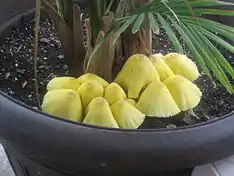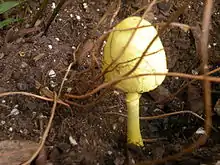Leucocoprinus birnbaumii
Leucocoprinus birnbaumii is a species of gilled mushroom in the family Agaricaceae. It is common in the tropics and subtropics. However, in temperate regions, it frequently occurs in greenhouses and flowerpots, hence its common names of flowerpot parasol and plantpot dapperling. It is considered toxic by the National Institutes of Health.[2][3]
| Leucocoprinus birnbaumii | |
|---|---|
float | |
| gills on hymenium | |
| cap is ovate or campanulate | |
| hymenium is free | |
| stipe has a ring | |
| spore print is white | |
| ecology is saprotrophic | |
| Leucocoprinus birnbaumii | |
|---|---|
 | |
| Leucocoprinus birnbaumii in flowerpot | |
| Scientific classification | |
| Kingdom: | |
| Division: | |
| Class: | |
| Order: | |
| Family: | |
| Genus: | |
| Species: | L. birnbaumii |
| Binomial name | |
| Leucocoprinus birnbaumii | |
| Synonyms[1] | |
|
Species synonymy
| |
Taxonomy
The species was first published as Agaricus luteus by the English mycologist James Bolton who described and illustrated it from a hothouse near Halifax in 1785.[4] Unfortunately, the name A. luteus had already been published for a different fungus, making Bolton's A. luteus illegitimate. Nonetheless, many popular North American books continued to use the name Lepiota lutea until the 1980s.[5][6] In 1839 Czech mycologist August Corda described the same species from Prague where it was found growing in a greenhouse by a garden inspector named Birnbaum, hence the epithet birnbaumii.[7]
English names
In the UK, Leucocoprinus birnbaumii has been given the recommended common name of "plantpot dapperling".[8] In North America, it has also been called the "yellow parasol",[5] "flowerpot parasol",[5] "yellow houseplant mushroom",[9] "lemon-yellow lepiota",[6] or "yellow pleated parasol".[10]
Description
Fruit bodies of Leucocoprinus birnbaumii are agaricoid (mushroom-shaped) and occur singly or in small clumps. All parts are bright, pale sulphur-yellow, but fade with age. When young, the cap is usually taller than broad, later becoming convex and around 20–60 mm (1–2.5 in) across. The cap surface is smooth but dotted with fine, easily detached scales, and often develops shallow, radial grooves near the margin. The gills are free (not attached to the stem) and are covered by a partial veil when young, which ruptures to leave a fragile, evanescent ring on the stem. Microscopically, the species is distinguished by its thick-walled, ellipsoid spores that are dextrinoid, have a germ pore, and measure around 8–12 by 5–9 μm.[11]

Similar species
Leucocoprinus straminellus is a similar, slightly paler (sometimes entirely whitish) species that may also occasionally appear in hothouses and plantpots in temperate regions. It is best distinguished microscopically by its smaller spores that lack a germ pore.[11] Leucocoprinus flavescens, described from North America, is also small-spored and has a yellowish cap with a brownish centre.[12] Leucocoprinus sulphurellus is a yellow species that occurs in the Caribbean area, but has gills that bruise bright blue-green.[7]
Habitat and distribution
Like all Leucocoprinus species, L. birnbaumii is a saprotroph, living on very decayed plant matter (humus or compost). The fungus is common throughout the tropics and subtropics, extending into warmer parts of the temperate zones. Rarely, it appears in cooler areas, fruit bodies having been recorded as far north as England,[13] but these seem to be temporary introductions. In these areas (such as North America, Europe, and Australia) it is more usually found in hothouses and plant pots than in the wild.[9][14]
Chemistry
The yellow color of the mushrooms is from alkaloids known as birnbaumins;[15] whether these compounds are toxic is unknown.
References
- Vellinga E.C. (2009). "Nomenclatural overview of lepiotaceous fungi (Agaricaceae), Version 4.7" (PDF). Nature.berkeley.edu. Retrieved 2 September 2017.
- Bazzle, Lisa J; Cubeta, Marc A; Marks, Steven L; Dorman, David C (16 December 2014). "Feasibility of flotation concentration of fungal spores as a method to identify toxigenic mushrooms". Veterinary Medicine. 6: 1–9. doi:10.2147/VMRR.S67794. PMC 6067785. PMID 30101091.
- https://plants.ces.ncsu.edu/plants/leucocoprinus-birnbaumii/
- Bolton, James (1788). An history of fungusses, growing about Halifax. 2. Huddersfield, UK: self-published. p. 50.
- Arora D. (1986). Mushrooms Demystified. Berkeley, USA: Ten Speed Press. pp. 668. ISBN 0-89815-169-4.
- Lincoff GH. (1981). National Audubon Society field guide to mushrooms - North America. New York: AAKnopf. p. 381. ISBN 0-394-51992-2.
- Roberts P, Evans S (2011). The Book of Fungi. Chicago, USA: Chicago University Press. p. 656. ISBN 978-0-226-72117-0.
- Holden EM. 2003. Recommended English names for fungi in the UK "Archived copy" (PDF). Archived from the original (PDF) on 2013-03-02. Retrieved 2012-09-19.CS1 maint: archived copy as title (link)
- Volk T. (2002). "Fungus of the Month for February 2002". Retrieved 2011-08-21.
- McKnight VB, McKnight KH (1987). A field guide to mushrooms, North America. Boston, Massachusetts: Houghton Mifflin. p. 448. ISBN 0-395-91090-0.
- Vellinga EC. (2001). Leucocoprinus in Flora Agaricina Neerlandica 5. Lisse, Netherlands: Balkema. pp. 76–84. ISBN 90-5410-494-5.
- MushroomExpert.Com. "Leucocoprinus flavescens (MushroomExpert.Com)". Mushroomexpert.com. Retrieved 2 September 2017.
- Legon NW, Henrici A (2005). Checklist of the British & Irish Basidiomycota. Kew, UK: Royal Botanic Gardens. p. 517. ISBN 1-84246-121-4.
- MushroomExpert.Com. "Leucocoprinus birnbaumii (MushroomExpert.Com)". Mushroomexpert.com. Retrieved 2 September 2017.
- Bartsch A, Bross M, Spiteller P, Spiteller M, Steglich W (2005). "Birnbaumin A and B: two unusual 1-hydroxyindole pigments from the "flower pot parasol" Leucocoprinus birnbaumii". Angewandte Chemie International Edition. 44 (19): 2957–2959. doi:10.1002/anie.200500082. PMID 15818629.